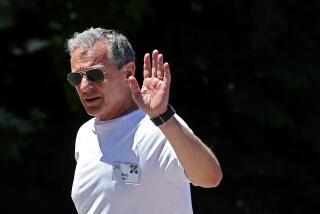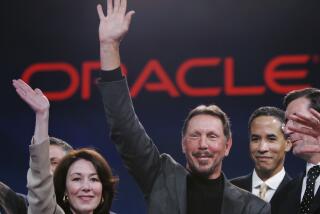Dissidents Were Heard, to a Point
Toward the end of Wednesday’s marathon shareholder meeting, Walt Disney Co. chief Michael Eisner found himself growing hoarse. “I’ve got no voice,” he said.
A few hours later, the same could be said of many Disney shareholders: It seemed as though they had no voice either -- at least in terms of pushing the company in a new direction.
By ending Eisner’s reign as chairman but leaving him in place as chief executive, critics said, Disney’s board of directors effectively dismissed the concerns of a huge number of investors.
What that action ensures is that the pressure on Disney -- and on Eisner -- isn’t about to go away. In fact, it’s sure to intensify.
“If they think this will satisfy shareholders, they’re deluding themselves,” said Paul Lapides, director of the Corporate Governance Center at Kennesaw State University in Atlanta.
In many ways, Eisner’s fate may depend on how the stock market reacts in coming days.
If Disney shares plunge, it would underscore that many investors are enraged -- and believe they have no leverage with a board that is supposed to be representing their interests.
What’s more, any drop in Disney stock would enhance the odds that cable operator Comcast Corp. could succeed in its unsolicited $50-billion takeover bid for the entertainment giant.
Disney’s board rejected the all-stock offer last month, calling it too low. And Disney’s shares have continued to trade well above the value of Comcast’s offer. A fall in Disney shares now could make Comcast’s offer look much more enticing.
The fallout from the annual meeting “should really open the door to a dialogue with Comcast,” said media analyst Jessica Reif Cohen of Merrill Lynch.
Some Disney investors said they weren’t surprised that the board allowed Eisner to remain as CEO for now. Letting him stay in that role in the short term could be merely “a face-saving gesture,” said Steven Cohen, chief investment officer at money manager Kellner DiLeo Cohen & Co. in New York. But longer term, Cohen added, “I don’t think he can survive.”
One media analyst, Richard Greenfield of Fulcrum Global Partners, agreed that Disney’s independent board members need to quickly announce a more detailed plan for dealing with the shareholder discontent.
“The board should go back and seriously consider asking Mr. Eisner to set a near-term retirement date to ensure a smooth transition to new management,” Greenfield said.
If the board doesn’t act swiftly enough, some speculated, Disney may well find itself facing a wave of shareholder litigation. “If it’s perceived that the board has done too little,” Reif Cohen said, “it could open the door to time-consuming and costly lawsuits.”
Meanwhile, Disney is sure to continue to be pounded by two former directors who have become its fiercest critics: Roy E. Disney and Stanley P. Gold.
The two men -- who orchestrated the campaign that led to a stunning 43% of shareholders not voting for Eisner at Wednesday’s annual meeting -- have vowed to keep up the fight against the Disney chief, whom they accuse of making a number of strategic, financial and creative missteps.
Some believe that Roy Disney and Gold could ultimately try to put up their own slate of directors -- including would-be successors to Eisner and new Chairman George J. Mitchell -- to contest the incumbent board. Under a proposal now before the Securities and Exchange Commission, if 35% or more of shareholders withhold their votes for a board candidate, such a challenge could begin.
Of course, in the view of many, things shouldn’t have to come to that.
“Michael and the board have to soberly reflect that they’ve been rejected by their owners,” said corporate governance expert Robert A.G. Monks.
“Michael Eisner has had one of the great careers in American industrial history and he should have some grace now and resign,” Monks added. “He should show some class. He’s been personally repudiated.”
Times staff writer Meg James contributed to this report.
More to Read
The biggest entertainment stories
Get our big stories about Hollywood, film, television, music, arts, culture and more right in your inbox as soon as they publish.
You may occasionally receive promotional content from the Los Angeles Times.










